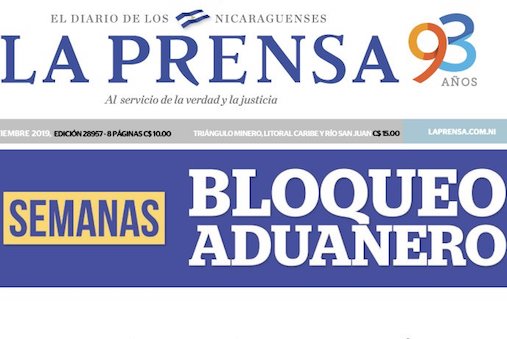El Nuevo Diario newspaper journalist Luis Galeano told the police and several human rights groups that he received a phone call and a letter warning him that he would be killed, Notimex reports.
After controversy sparked by a language in a bill that created crimes of “media violence," referring to content that disparages or satirizes women, the Supreme Court decided to withdraw the bill, barely more than a week after it was originally submitted to the National Assembly, EFE and La Prensa report.
Nicaragua imposed a series of restrictions on paper imports by El Nuevo Dario, a newspaper that recently reported that the authorities had threatened its journalists after publishing allegations of corruption in the Ministry of Finance.
The Nicaraguan Center for Human Rights (CENIDH) announced that in the coming weeks it will present a report to the Inter-American Human Rights Commission (CIDH) about press freedom violations in the country, AFP reports. In recent months, two newspapers have alleged persecution at the hands of President Daniel Ortega, while an opposition TV network went off the the air several days ago.
The Nicaraguan newspaper El Nuevo Diario reported that its journalists were threatened after publishing articles about supposed corruption in the government of President Daniel Ortega, according to the local press. The cases of corruption and nepotism are related to the Finance Ministry and the equivalent of the IRS, the newspaper said.
The Nicaraguan newspaper El Nuevo Diario reported that its journalists were threatened after publishing articles about supposed corruption in the government of President Daniel Ortega, according to the local press. The cases of corruption and nepotism are related to the Finance Ministry and the equivalent of the IRS, the newspaper said.
Two years ago this week, a police raid on a media research center in Managua run by journalist Carlos Fernando Chamorro prompted international concern that President Daniel Ortega’s government was persecuting his critics—such as Chamorro—and violating press freedom.
Ana L. Urbina, a correspondent for channels 8 and 11, and five members of the Red Cross died when the ambulance and truck they were traveling in was swept away by the rain-swollen Tecolostote River in central Nicaragua, Boaco Department, El Nuevo Diario reports. (See EFE's report in English.)
In the middle of August, the newspaper La Prensa in Nicaragua said it was firing 23 delivery workers, but the Labor Ministry ordered their rehiring, which according to the newspaper — a strong opponent of President Daniel Ortega— is part of a “political persecution” trying to restrict freedoms of press and opinion.
Renowned journalist Carlos Fernando Chamorro is among the winners of the 2010 Maria Moors Cabot Prize. The annual award recognizes excellence in coverage of Latin American and Carribean issues and is organized by the Journalism School at Columbia University.
Don’t expect relations between Hugo Chávez and the U.S. media to improve in 2010. Venezuela’s government long ago declared war on “media terrorism,” its term for news organizations that criticize Chávez from within and outside the country. Chávez recently slammed the U.S. magazine Newsweek for its predictions that in 2010 Chávez faces another coup and that his mentor Fidel Castro will die this year in Cuba.

Nearly seventeen months after protests first broke out in Nicaragua, independent journalists in the country and international press advocates are repeating calls to protect media workers and freedom of expression.